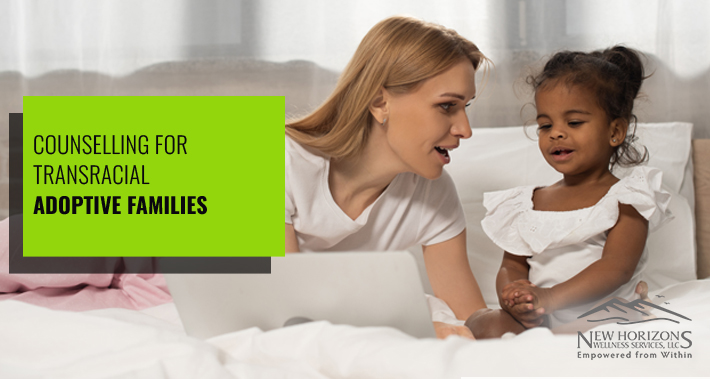
If you’re a parent, you know that parenting is both a challenge and a reward.
This is especially true if you choose to make adoption part of your parenting journey.
If you’re adopting, you may have some unique experiences and challenges that you wouldn’t experience with a biological child.
For example, you’ll have to help your child navigate complex feelings about their birth parents.
You might have to navigate any trauma your child has experienced from the adoption process.
And you may find yourself unsure of what to do if your child is African American but you and your family are white.
If navigating a transracial adoption is something you’re working on right now, our therapy clinic serving Portland Oregon is here to help.
Read on to learn more about transracial adoption and how we can help you.
What Is Transracial Adoption?
A transracial adoption is a specific kind of adoption where the adoptive family is a different ethnicity from the child they adopt.
In America, the most common kind of transracial adoptions happen when a white family adopts a child of color.
However, the specific ethnicity of the parents and child doesn’t actually matter.
So long as they’re of two different ethnicities, the adoption is considered transracial.
In this article, we’ll be talking about white families with Black or African American children.
If you find yourself in a different situation, some of our advice may still be helpful for you.
What Are Potential Issues With Transracial Adoption?
Whether you’re a parent of a transracial adoptee or a child who’s been adopted, you’re bound to face some unique experiences.
Transracial adoptees may feel isolated because they don’t see other people like them, and they may struggle with their self identity.
On the other hand, as a parent, you might be unprepared for the realities of racism in America that your African American child might face.
Let’s take a closer look at these issues.
1. Racial Isolation
When you live in an area where there is no one that looks like you, it can feel isolating.
If you live in a primarily white neighborhood, your child may not get the opportunity to see people like them in their day to day lives.
This lack of representation can make your child feel singled out and different.
2. Difficulties With Self Identity
Often, when transracial children are raised in white families, they are raised as a “white kid” who just looks different.
Other children and families in your neighborhood are also likely to treat them as just another “white kid” to avoid being politically incorrect or bringing up your child’s race.
However, when they leave their immediate community, they’re more likely to group themselves with people who look like them.
This can lead to a lot of challenges.
If your child doesn’t have a connection to their culture, they may not know how to act around others who share their ethnicity.
This can get them into trouble and lead to confusing feelings.
After all, their local community might have treated them like just another white kid, but society at large won’t.
Do they belong to the group of people who look like them?
Or do they belong to the people they were raised to be like?
RELATED: Depression In The African American Community
3. Parents Who Are Unprepared For The Realities Of Racism In America
Talking about racism is uncomfortable.
It can be especially hard when it’s your child you have to talk to about racism.
Some parents want to put it off to avoid bringing up tough conversations.
But many people just don’t realize the impact racism has on a child, especially when you’ve never been in a position to experience it yourself.
Unfortunately, racism in America is inevitable.
It’s a sad fact of life that your child will experience racism.
And it won’t wait until your child is grown up enough to handle it.
When parents are unprepared for the reality of racism, they can do their child a disservice.
The first time your child understands that the color of their skin makes them different shouldn’t also be the first time they are insulted for it.
RELATED: This Martin Luther King Jr Day, Commit To Raising Antiracist Kids
Does This Mean Transracial Adoption Is A Bad Idea?
Absolutely not.
It just means that there are some real challenges when it comes to being a white parent raising an African American child.
It also means that it’s important to be prepared for these unique challenges.
How To Be A Supportive Parent To A Transracial Adopted Child
So, we’ve established that it’s important to be a supportive parent to your transracial adopted child.
And we know some of the challenges that your child may face.
But how do you become a parent that can help your child face and overcome these challenges?
Let’s take a closer look.
1. Address The Reality That They Were Adopted
Some parents choose to raise an adopted child with no knowledge of their birth parents, while others acknowledge their child was adopted from a young age.
Which of these strategies is ideal for your child is a subject for another article.
But when your child is a noticeably different ethnicity from you, it will be quite obvious they’re adopted.
However, it’s important to create space for your child to talk about it.
Some parents feel like they should wait until their children bring it up themselves.
But making your child initiate the conversation can put a lot of pressure on them and make them feel like they can’t talk about their adoption.
Discussing your child’s adoption with them allows them to know that conversations about their adoption are safe and encouraged.

2. Helping Your Child Connect With Their Birth Culture – If They Want To
Every transracial adopted child is different.
Some will feel strongly about connecting with their birth culture.
Others won’t necessarily be interested in their birth culture.
However, knowing that they have the option to connect if they want to will help them to make that decision themselves.
It’s important that they have the option especially as they work on forming an identity between their birth culture and the culture they were raised in.
Helping them connect with their birth culture can help develop the social skills they’ll need to navigate the world as an adult.
3. Avoid Pressuring Your Child Into Situations Where They Feel Unsafe
Sometimes, places or people will make your child feel uncomfortable or overwhelmed.
This could be places in the community where they feel singled out for looking different.
It could also be people who ask them uncomfortable questions or make them feel unsafe.
Whatever the reason, there will be spaces or people your child will want to avoid.
Having the support of a parent makes it much easier for your child to identify safe and unsafe places and make sure they’re in places that feel comfortable.
4. Don’t Be Afraid To Ask For Help
It takes a village to raise children.
This is even more true when your child is a transracial adoptee.
The truth is, there are going to be things that you don’t know.
The truth is, your child might experience trauma connected to their adoption.
That doesn’t mean you can’t still raise your child to grow into a healthy, happy adult.
But you’ll need help.
You’ll need the help of your family, of friends, and possibly a professional, too.
Family counseling, counseling for your adopted child, and counseling for yourself are all good ideas.
This can help make the home feel safe for your child, encourage hard conversations, and provide support to everyone in the family.
Book Your Appointment With New Horizons Wellness Services Today
Being a supportive parent of a transracial adopted child is hard, but you’re not alone.
At New Horizons Wellness Services, we’re here to help.
We have a multiracial team of therapists here to help provide professional counseling for families who pursue transracial adoption, either in person or through teletherapy.
Whether you’re thinking about a transracial adoption or already have a beautiful transracial family, we’re here to help.
Book your appointment with New Horizons Wellness Services Today.
Yours in Health,
New Horizons Wellness Services13333 SW 68th Pkwy,
Tigard, OR 97223
- https://g.page/newhws
New Horizons Wellness Services provides a true multidisciplinary approach to mental & physical health treatments for children, adults and families.
